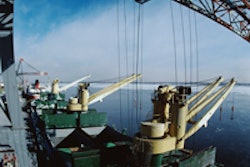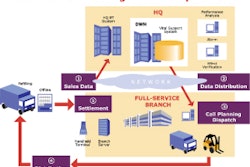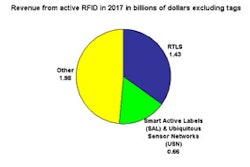New York — October 3, 2007 — Supply chain integration is quite a popular topic these days. Why now? Clearly, this is not a recently discovered area of economic activity; nor has it been neglected over the years. I would suggest that the definition of supply chain management has evolved and matured to encompass more than the physical movement of product, the ongoing process improvements related to simplified sourcing, the faster transportation of raw materials and finished goods, and the fine tuning of just-in-time inventory practices.
Supply chain management — or "business value chain" management, to be more precise — has assumed a much broader importance in the commercial world, with corporate treasurers, government officials, technology providers, bankers and logistics professionals all sharing a critical interest in the many facets of the worldwide flow of goods and services.
Let's look at why these various constituencies have elevated their interest in this subject.
Corporate treasurers have discovered (or perhaps re-discovered) the positive financial impact of efficient supply chain management. They have also been reminded of the drain on cash flow caused by inefficiencies in the way their firms handle the day-to-day business of producing, distributing and selling their core products. Gone are the days when these activities were primarily the purview of "the operations people." Competition in every industry continues to increase at an incredible pace, and the financial survival of many companies is decided by how effectively they focus on executing against their key operating benchmarks. Cost reduction, process outsourcing and real-time management of financial information are all factors of critical importance to treasurers. In a sense, they too are now "operations people."
Government officials have played an expanded role in the past few years, not only to address issues of national growth, but also to enhance customs and tax collection opportunities — and, of course, to expand and enforce regulatory compliance and security requirements. In the wake of 9/11, as the global focus intensifies on issues ranging from container security to antimony laundering and the financing of terrorist organizations, it is a certainty that the worldwide regulatory environment will become more complex and more far-reaching in scope. The cost of non-compliance for supply chain participants will be very high. Greater inter-governmental cooperation will ensure that avoidance of these sanctions becomes increasingly difficult.
Technology providers find themselves with a tremendous opportunity to meet rising market demand for solutions that improve supply chain functionality and flexibility. However, given the pace of change in industry requirements and the demands for rapid global deployment of operational technology, these firms will need to commit substantial amounts of human and financial capital to the development and implementation of both software and hardware tools — many of which will be overtaken by newer offerings within a relatively short timeframe. Focusing on customer requirements will be critical, as will the ability to support deployed technologies on a worldwide basis.
Bankers are newer players on this field, although they have been involved in the financial aspects of supply chain management for quite a long period of time. While the provision of services such as commercial letters of credit, steamship guarantees and pre-export loans has addressed some of the financing and settlement needs of buyers and sellers in cross-border transactions, the bankers now find it necessary to be able to engage in a much wider spectrum of world trade facilitation — namely, integration with the physical aspects of global commerce. Today's major financial institutions have an interesting and somewhat unique opportunity to service the entire range of a corporate client's trade needs through the provision of a comprehensive commercial management program. It is doubtful that the banks will undertake the actual physical aspects of trade logistics (such as loading airplanes or sailing container vessels), but they can increasingly play a crucial intermediary role between their customers and all of the numerous participants in the extended supply chain — freight forwarders, customs brokers, inspection firms and so on. This role requires the acquisition of a broad range of knowledge and operational skills which have not traditionally resided in financial institutions. Required as well is a commitment to understanding the specific needs of clients in different industries, particularly their various logistical and regulatory business requirements. However, for those firms willing to make the necessary long term investments in people and technology, there appears to be a very attractive present — and future — market opportunity.
Logistics companies remain the most obvious players on the scene. These are the many firms that actually arrange, coordinate and execute the physical movement of raw materials, components and finished goods around the world. All facets of the logistics industry have become subject to ongoing consolidation, heightened competition and relentless pressure to reduce costs, while the various providers strive to deliver ever quicker and more customized client services. Much like bankers, logistics companies have been pushed by their customers to vertically integrate their services and adopt greater levels of interoperability among the whole range of industry participants. Faced with increased technical demands from clients and a rapidly growing roster of regulatory and legal stipulations to which they must adhere, many logistics firms have sought to obtain needed capabilities and achieve greater operational scale through mergers, cooperative arrangements and functional integration. Again, like the financial institutions, some of the largest global operators have begun to combine the physical and financial streams of supply chain management through the acquisition of banking licenses, thereby giving themselves (and their customers) entrée to the full end-to-end range of trade services. While these ventures have not yet attained maturity, it is clear that the barriers to entry across the supply chain spectrum are falling rapidly and that these trends will only accelerate in the near future.
Many recently published interviews with the senior officers of major trade providers — both banks and non-banks — center on the theme of "What is your company doing to adjust to a rapidly changing marketplace?" These discussions appear to indicate that some are further down the track than others in terms of understanding and adapting to these new developments, but there are virtually no firms that are oblivious to the seismic shifts taking place in their traditional business models.
Banks have become very proficient at the financial aspects of the trade business. However, it is obvious that our customers — who actually engage in the underlying commercial transactions that we facilitate — are raising their expectations of us and demanding that we approach the business the way they that they do: as an integrated assembly of the disparate products and services that they require in order to be successful in the global marketplace. Trade providers who are able to understand the details of a client's business flows and to anticipate emerging requirements across a company's operational spectrum will be rewarded with an increasing share of their customers' trade wallets. A failure to adapt to these changing needs will result in continuing price pressure and a commoditization of their products and services.
All of the key participants need to provide critical insight into this subject, as well as challenging each other to continually re-examine their contribution to the business value chain. When this overall process works well, it's practically transparent; when it doesn't, it can be confusing, costly and difficult to correct. All of us have a major stake in ensuring that this integration initiative is successful.
Supply chain management — or "business value chain" management, to be more precise — has assumed a much broader importance in the commercial world, with corporate treasurers, government officials, technology providers, bankers and logistics professionals all sharing a critical interest in the many facets of the worldwide flow of goods and services.
Let's look at why these various constituencies have elevated their interest in this subject.
Corporate treasurers have discovered (or perhaps re-discovered) the positive financial impact of efficient supply chain management. They have also been reminded of the drain on cash flow caused by inefficiencies in the way their firms handle the day-to-day business of producing, distributing and selling their core products. Gone are the days when these activities were primarily the purview of "the operations people." Competition in every industry continues to increase at an incredible pace, and the financial survival of many companies is decided by how effectively they focus on executing against their key operating benchmarks. Cost reduction, process outsourcing and real-time management of financial information are all factors of critical importance to treasurers. In a sense, they too are now "operations people."
Government officials have played an expanded role in the past few years, not only to address issues of national growth, but also to enhance customs and tax collection opportunities — and, of course, to expand and enforce regulatory compliance and security requirements. In the wake of 9/11, as the global focus intensifies on issues ranging from container security to antimony laundering and the financing of terrorist organizations, it is a certainty that the worldwide regulatory environment will become more complex and more far-reaching in scope. The cost of non-compliance for supply chain participants will be very high. Greater inter-governmental cooperation will ensure that avoidance of these sanctions becomes increasingly difficult.
Technology providers find themselves with a tremendous opportunity to meet rising market demand for solutions that improve supply chain functionality and flexibility. However, given the pace of change in industry requirements and the demands for rapid global deployment of operational technology, these firms will need to commit substantial amounts of human and financial capital to the development and implementation of both software and hardware tools — many of which will be overtaken by newer offerings within a relatively short timeframe. Focusing on customer requirements will be critical, as will the ability to support deployed technologies on a worldwide basis.
Bankers are newer players on this field, although they have been involved in the financial aspects of supply chain management for quite a long period of time. While the provision of services such as commercial letters of credit, steamship guarantees and pre-export loans has addressed some of the financing and settlement needs of buyers and sellers in cross-border transactions, the bankers now find it necessary to be able to engage in a much wider spectrum of world trade facilitation — namely, integration with the physical aspects of global commerce. Today's major financial institutions have an interesting and somewhat unique opportunity to service the entire range of a corporate client's trade needs through the provision of a comprehensive commercial management program. It is doubtful that the banks will undertake the actual physical aspects of trade logistics (such as loading airplanes or sailing container vessels), but they can increasingly play a crucial intermediary role between their customers and all of the numerous participants in the extended supply chain — freight forwarders, customs brokers, inspection firms and so on. This role requires the acquisition of a broad range of knowledge and operational skills which have not traditionally resided in financial institutions. Required as well is a commitment to understanding the specific needs of clients in different industries, particularly their various logistical and regulatory business requirements. However, for those firms willing to make the necessary long term investments in people and technology, there appears to be a very attractive present — and future — market opportunity.
Logistics companies remain the most obvious players on the scene. These are the many firms that actually arrange, coordinate and execute the physical movement of raw materials, components and finished goods around the world. All facets of the logistics industry have become subject to ongoing consolidation, heightened competition and relentless pressure to reduce costs, while the various providers strive to deliver ever quicker and more customized client services. Much like bankers, logistics companies have been pushed by their customers to vertically integrate their services and adopt greater levels of interoperability among the whole range of industry participants. Faced with increased technical demands from clients and a rapidly growing roster of regulatory and legal stipulations to which they must adhere, many logistics firms have sought to obtain needed capabilities and achieve greater operational scale through mergers, cooperative arrangements and functional integration. Again, like the financial institutions, some of the largest global operators have begun to combine the physical and financial streams of supply chain management through the acquisition of banking licenses, thereby giving themselves (and their customers) entrée to the full end-to-end range of trade services. While these ventures have not yet attained maturity, it is clear that the barriers to entry across the supply chain spectrum are falling rapidly and that these trends will only accelerate in the near future.
Many recently published interviews with the senior officers of major trade providers — both banks and non-banks — center on the theme of "What is your company doing to adjust to a rapidly changing marketplace?" These discussions appear to indicate that some are further down the track than others in terms of understanding and adapting to these new developments, but there are virtually no firms that are oblivious to the seismic shifts taking place in their traditional business models.
Banks have become very proficient at the financial aspects of the trade business. However, it is obvious that our customers — who actually engage in the underlying commercial transactions that we facilitate — are raising their expectations of us and demanding that we approach the business the way they that they do: as an integrated assembly of the disparate products and services that they require in order to be successful in the global marketplace. Trade providers who are able to understand the details of a client's business flows and to anticipate emerging requirements across a company's operational spectrum will be rewarded with an increasing share of their customers' trade wallets. A failure to adapt to these changing needs will result in continuing price pressure and a commoditization of their products and services.
All of the key participants need to provide critical insight into this subject, as well as challenging each other to continually re-examine their contribution to the business value chain. When this overall process works well, it's practically transparent; when it doesn't, it can be confusing, costly and difficult to correct. All of us have a major stake in ensuring that this integration initiative is successful.













